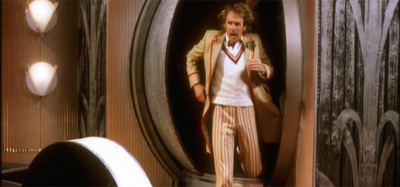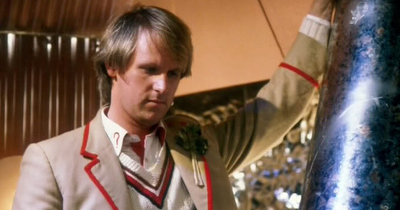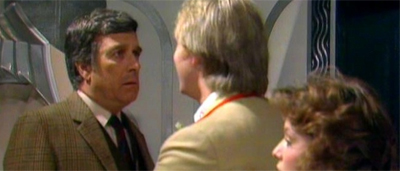To celebrate the fiftieth anniversary of the longest-running science-fiction show in the world, I’ll be taking weekly looks at some of my own personal favourite stories and arcs, from the old and new series, with a view to encapsulating the sublime, the clever and the fiendishly odd of the BBC’s Doctor Who.
Mawdryn Undead originally aired in 1983. It was the first instalment in the Black Guardian Trilogy.
Oh look, it’s all a long time ago, Doctor. I mean, surely what’s past is —
Very much in the present, Brigadier. You never did understand the interrelation of time.
– Brigadier and the Doctor have a bit of time travel trouble
Mawdryn Undead is a bit of a strange beast. It’s written by director Peter Grimwade, who last wrote the script for the unbelievably bad Time-Flight, which is a serious contender for the worst Doctor Who adventure of the eighties – no small accomplishment in a decade that gave us The Twin Dilemma and Timelash. Still, Mawdryn Undead is an entertaining little romp with a clever central concept that is somewhat overshadowed by the fact that Grimwade seems to have been given a laundry-list of tasks to accomplish with his script. With the serial featuring the Brigadier, introducing Turlough and kick-starting The Black Guardian trilogy, you can understand why the rather nifty little time-travel story tends to get overshadowed a bit.
I’m a sucker for adventures that make use of time travel in any way – be it the temporal paradox of Day of the Daleks or the plot to erase history in City of Death, I like it when a show about time travel uses the Doctor’s nature as more than just a plot device to set up the adventure of the week. I don’t think it’s unreasonable to suggest that this is probably a reason why Steven Moffat – the master of the “timey wimey” ball – has such an affection for the period as well. While there are more obvious examples of the show experimenting with the ramifications of time travel outside these seasons, I don’t think so many ideas were ever incorporated so thoroughly and so frequently.
I think at least part of the reason for my fondness of the Davison era – despite the fact that the budget was showing, the lighting was too high and the soundtracks were occasionally terrible – stems from its use of time travel in the background of the episodes, with that travel frequently occurring within the plot of a given episode, rather than merely as a means to establish it. Here, in Mawdryn Undead, we have two versions of the Brigadier from two points within his own time stream, with 1983 and 1977 out of whack. In Terminus, there’s the explosion that traveled back in time to create “Event One.” Four to Doomsday had the Monarch’s attempt to rewrite the birth of the universe and Earthshock featured the explosion that killed the dinosaurs. I even like the fact the period included the last televised “true” historical in Black Orchid and the wonderful mesh of Edwardian ships and future technology in Enlightenment.
I think that’s a deadly hook for the story to have – unfolding in two different time periods that are out of synch with one another. The problem is that this really clever hooks gets drowned out be everything else going on around it. It’s not that the ideas blotting it out are necessarily bad ideas, it’s just that there’s too many of them. So we have the stolen Time Lord technology, the return of the Brigadier, the plot to kill the Doctor and (because John Nathan-Turner wanted it) the Silver Jubilee celebrations. It really feels like too much, and the result is that relatively little in the story has room to breath.
Let’s start with the return of the Black Guardian. I’ve remarked before that The Key to Time felt like a bunch of stories with a plot device used to connect them. Any of the stories could easily have been told without the overarching theme. This is also true of the three stories in The Black Guardian Trilogy, but I’d argue to a lesser extent. Here the Black Guardian’s plot feels like more than just window dressing, serving to establish Turlough as one of the series’ most fascinating companions and creating a fairly clear and present danger. Still, I’ve always found the plotline a little strange.
While Valentine Dyall is a great actor (with a great voice), the whole thing seems just a little bit strange and arbitrary. Why is the Black Guardian attacking the Doctor now? Surely there’s a better weapon than Turlough? More than that, once he’s defeated (or vanquished) at the end of the trilogy, why doesn’t he just try again? It seems like an incredibly petty and vindictive grudge, when you imagine his time would be better spent hunting for the Key to Time again, rather than bumping off the one guy who managed to find it. It doesn’t help that the sum of his characterisation is “in the name of all that is evil, the Black Guardian orders you to destroy him now!” and “I am the Black Guardian! the Doctor’s good is my evil!” There really isn’t a lot to work with, but Dyall gives it his all.
However, where Grimwade’s serial does work is in the clever examination of the nature of the trust involved in traveling on the TARDIS. There’s a wonderful two-way street required between the Doctor and those who come with him. They trust him with their lives, and he trusts them with the entirety of time and space. Mawdryn Undead very cleverly examines that fundamental principle from both sides. It asks the companions to accept a stranger in the TARDIS who claims to be a regenerated Doctor, and it sends an assassin to accompany him on his travels. It’s a wonderful deconstruction of the dynamic necessary for the team work, and it very successful points out that the entire system is open to abuse.
The Doctor is entirely accepting of Turlough when he arrives, brushing past him casually in the TARDIS before he even realises that there’s something amiss. It’s telling that even Nyssa, the reserved member of Davison’s TARDIS crew, is more suspicious of Turlough than the Doctor is. When he recounts that the transmat pod brought him to the alien ship, she skeptically asks, “And you just walked in?” It sounds pretty convenient when you put it like that, and while we watch Turlough basically manuever himself on to the team. However, the irony is that there’s nothing strange about all this contrivance around Turlough’s arrival – it’s exactly what happens with most companions.
Tegan is the voice of cynicism, remarking, “Nobody from Earth is just going to walk into a transmat capsule.” However, Nyssa is very quick to counter that she didn’t do anything that different, asking, “As you did into the Tardis on the Barnet bypass?” This is the system the show uses, and Turlough is just exploiting it. While the assassination plot against the Doctor isn’t handled especially well (really? a rock?), the story does a very good job examining how fragile the system really is and how little the Doctor really knows about any of his companions.
And it works the other way as well. The companions know relatively little of the Doctor. So little that, when an imposter arrives claiming to be his newly regenerated form, they have no way of disproving it. As the Brigadier states, “Do we have any real choice? We must give him the benefit of the doubt in case he is the Doctor.” It isn’t that Nyssa and Tegan are blind fools – they’re both skeptical – but it’s that it is entirely possible that this stranger barging into the TARDIS is a regenerated and disorientated Doctor. They have to trust him, because that’s the way that the system works.
By the way, I do like to think that Mawdryn’s ridiculously “rainbow” attire sort of foreshadows Colin Baker’s arrival in the role. With Mawdryn’s flowing gowns with wrapped colour, it seemed that any Doctor regenerating from Davison was going to be a bit gawdy. Speaking of which, I can’t decide if I love or hate Davison’s sideburns. It’s the eighties, so they’re a decade late, but I think that they might add to the anachronistic appeal of the character. Still, I’m struck by how hard it is not to notice them in these episodes.
I have to admit that I quite like the look of Mawdryn Undead. The space craft looks suitably strange and creepy, and I do like the look of Mawdryn and his erstwhile companions. I think the design team did some very good work, even if the lighting is turned waaaay too high. While the special effects aren’t groundbreaking, they do suggest that Grimwade had learned his lesson from Time-Flight about what is and isn’t possible on the show’s budget. I will not that CGI added by the Doctor Who Restoration Team (optional, of course) is purely functional, and doesn’t look quite as impressive as the work on Enlightenment or even Terminus.
The episode is also noteworthy for featuring the Brigadier, in one of the many nods to the show’s history contained in its twentieth season on the air. It’s very clear that the part was originally written to use Ian Chesterton, but Nicholas Courtney does a great job with the fairly limited material that he has. Again, one of the nicer things about Grimwade’s script – and it’s probably unintentional – is the way that it examines the Doctor’s attitude towards his long-term companions, and the consequences of traveling with him. They aren’t always as great as they might seem, and there’s something tragic about the Brigadier here.
He has gotten old, but he has gotten old alone. He’s a perpetual bachelor who lives alone and seems to have nothing to love except his car. It seems that all he knew was UNIT, the task force he helped set up back in the day with the Second Doctor, which makes his dismissal from it seem kind of tragic. “Had a bit of bother a while back,” he explains, recounting his history. “Overwork, you know. Doctor Runciman called it a nervous breakdown. Breakdown. Don’t know the meaning of the word. This one goes on till he drops.” There’s a swell of pride in his words, but it’s hard not feel a bit sad for the man who devoted his entire life to an idea, only to be thrown out.
Indeed, Mawdryn Undeadexplores the incidents that led to his nervous breakdown, and we watch them play themselves out. The Doctor is an active part in it (even if he doesn’t intend any harm) and he boots the 1977 version of the Brigadier out of the TARDIS to be found by Doctor Runciman. The fact that the 1983 version remains the same suggests that the Doctor didn’t prevent the nervous breakdown, but was the incident that caused it. That’s what the Brigadier got for his time with the Doctor, a lonely shack in a British boarding school and a nervous breakdown.
While some might prefer the rather affectionate portrayal of past companions who landed on their feet (like in School Reunion), I do like this contrasting account – after all, while some companions do build good lives for themselves, it seems unlikely that all do. Given the Brigadier’s attitude to his students (“if you took more regular exercise, Ibbotson, not only would your body be less disgusting, but you’d enjoy a healthier imagination”), it’s hard to believe that he’s found peace here. The Doctor isn’t a bad person, and it’s not that he doesn’t care (indeed, he asks after all his old friends), it’s just that he moves on regardless. You get left behind, whether you’re ready to or not.
It is interesting to consider the portrayal of the Brigadier here. He seems very much a man out of touch with modern life – for example, he insists that the women wait in the TARDIS (causing Tegan to brand him a “chauvinist”) and asks about Turlough, “I trust you flogged that young man within an inch of his life?”It’s an interesting aspect to this particular companion, that he could be left so far behind the times. In fairness, his chivalrous attitude is certainly in character with the Brigadier we saw during the UNIT era. In fairness, it’s an interesting illustration of the contrast between the two: the Doctor is a man out of time, while the Brigadier is clearly a man fixed in a very particular time.
Mark Strickson does a great job with Turlough, even if the character does strain belief by (a.) wearing a school uniform and (b.) talking to a magical glowing cupcake. I like the character of Turlough, if only because he’s a nice contrast to Davison’s Doctor, but also because Strickson generally does a very good job with incredibly hammy material. It’s a shame that the writers seemed to have little idea what to do with Turlough outside the stories that introduced him.
It’s also interesting to note the Doctor’s attitude to Mawdryn and his colleagues, who made the mistake of stealing Time Lord technology in order to live forever. In fairness to The Black Guardian Trilogy, Mawdryn Undead and Enlightenment do share certain key themes about the eternity and immortality (even if Terminus feels like the odd one out). So Davison’s Doctor establishes his distrust of those who would live forever here, even if it’s better defined in the final part of the adventure. Given the Doctor stole some Time Lord technology himself, it feels strange to see him being so unforgiving, insisting, “It’s the result of your own criminal ambition.” However, his observation that “sometimes you have to live with the consequences of your actions”does seem quite poetic in terms of the character’s recent history with his own people.
Mawdryn Undead is a little uneven, suffering from having a bit too much to do. Still, it’s an entertaining Davison era story with some very cheesy effects work. There’s some interesting stuff going on here, it’s just a shame that it all feels crammed into a relatively small space.
I don’t fancy a non-stop mystery tour of the galaxy.
– quoth Tegan, who travels in the TARDIS
Filed under: Television | Tagged: bbc, Black Guardian, Brigadier, doctor, doctor who, DoctorWho, Mawdryn, Mawdryn Undead, Nicholas Courtney, Nicolas Courtney, Peter Davison, Peter Grimwade, The Black Guardian Trilogy, The Brigadier, Time Lord, time lords, Time-Flight |






























Leave a comment